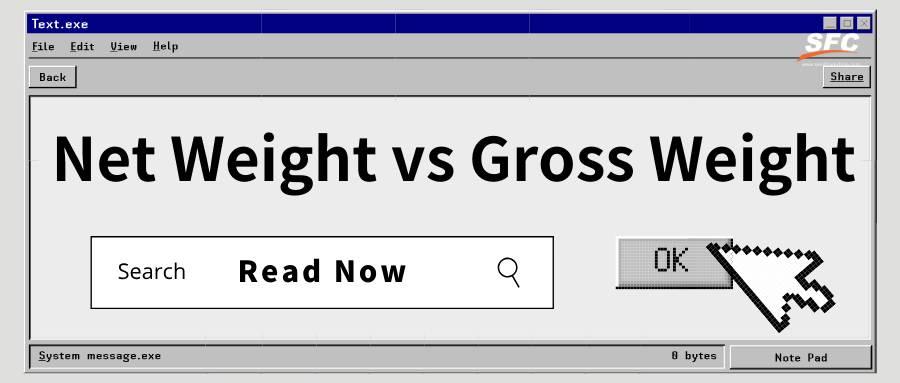Table of Contents
Net Weight vs Gross Weight: All You Need to Know
Time: Feb 18,2025 Author: SFC Source: www.sendfromchina.com
Shipping costs, tariffs, and product pricing are all heavily influenced by net weight and gross weight. But what exactly do these terms mean, and why do they matter to your business? In our in-depth guide, we’ll break down everything you need to know about net and gross weight—how to calculate them, why they’re important in shipping and logistics, and how they affect your costs.Whether you're shipping domestically or internationally, understanding these key measurements is critical for improving efficiency and ensuring compliance. Read on to discover the impact of net weight and gross weight on your shipping operations.

1. What Is Net weight
Net weight refers to the weight of the product itself, without any additional packaging, containers, or other accessories. It is the pure weight of the item you're purchasing, and it’s a critical metric for businesses when determining product pricing, shipping costs, and inventory management.For example, if you're buying a bag of flour, the net weight would only include the weight of the flour inside the bag, not the bag itself. The measurement is crucial because it's the actual product the customer is buying, and it directly impacts product-based costs, such as cost per unit, distribution, and overall profitability.
Net Weight in Different Industries
- Food Industry: Net weight is commonly used to denote the amount of food a customer is receiving. Net weight excludes packaging like cans, bottles, or boxes.- Manufacturing and Retail: In manufacturing, the net weight of a product helps in calculating raw material usage and manufacturing costs. In retail, it's important for ensuring the correct amount of product is being sold.
- Chemicals and Pharmaceuticals: Net weight also plays a crucial role in industries like chemicals and pharmaceuticals where precise quantities matter for both safety and compliance reasons.
2. What is Gross weight

For instance, when shipping a box of books, the gross weight would include the weight of the books themselves as well as the weight of the box, padding, and any other materials used to protect the books during transit.
Gross Weight in Shipping and Logistics
In shipping, gross weight is a key metric for determining shipping costs. Since transporters charge based on the total weight of the cargo, the gross weight helps businesses calculate the total cost of delivery. It also plays a role in ensuring that shipments comply with weight restrictions on certain transportation methods, whether by air, sea, or road.Gross Weight in Customs and Import/Export
When shipping internationally, gross weight is also used for customs declarations. The total weight helps determine tariffs, taxes, and any other fees that might apply based on the weight of the cargo. Customs authorities often need this information to process and clear shipments more efficiently.3. Why Net Weight and Gross Weight Matter in Shipping and Logistics

Shipping Costs
Gross weight is the most important factor when calculating shipping costs. Carriers charge based on the total weight of the product, including its packaging and any other accessories required for safe transport.Regulatory Compliance
Many countries and international regulations require businesses to declare the gross weight of shipments when crossing borders, including weight declarations for customs, which influence taxes, duties, and clearance times. Failing to provide an accurate gross weight could lead to fines, delays, or shipment rejection.Inventory Management
Net weight is often used in inventory control to determine how much product is in stock, what needs to be restocked, and how much to order from suppliers. Accurate net weight information ensures that inventory is correctly calculated, reducing the risk of overstocking or understocking.Sustainability and Packaging
Understanding the weight of the packaging materials (and comparing net vs. gross weight) can help businesses minimize packaging waste. By reducing unnecessary weight, companies can lower shipping costs and reduce their environmental impact, which is an increasingly important factor in modern logistics and corporate responsibility.Customer Expectations
In industries where product weight is a critical factor, such as food or supplements, customers often care about net weight because it tells them exactly how much of the product they are receiving. Transparent labeling of net and gross weights helps establish trust and prevent confusion, especially in e-commerce.4. How to Calculate Net Weight and Gross Weight

Net Weight Calculation
To calculate net weight, simply subtract the weight of the packaging and any other non-product elements from the total weight of the item. The formula is as follows:Net Weight = Gross Weight – Packaging Weight
For example, if a box of toys weighs 5 kg (gross weight) and the packaging weighs 1 kg, the net weight of the toys would be:
Net Weight = 5 kg – 1 kg = 4 kg
Gross Weight Calculation
Gross weight is typically the total weight of the product, including all packaging materials. For example, if you're shipping a product with additional padding, labels, or boxes, the weight of all these elements is added to the net weight to calculate the gross weight. The formula is:Gross Weight = Net Weight + Packaging Weight + Other Accessories
If the toy box’s net weight is 4 kg and the packaging and accessories weigh 1 kg, the gross weight would be:
Gross Weight = 4 kg + 1 kg = 5 k
5. Differences Between Net Weight and Gross Weight

Purpose
- Net Weight: Represents the weight of the actual product.- Gross Weight: Represents the total weight of the product including packaging and shipping materials.
Use in Shipping and Customs
- Net Weight: Often used for calculating the value of the product and inventory management.- Gross Weight: Primarily used for calculating shipping costs, customs duties, and fees.
Impact on Cost
- Net Weight: Affects the cost of the product itself and manufacturing processes.- Gross Weight: Impacts the cost of transportation and delivery.
Regulatory Importance
- Net Weight: Required for product labeling and compliance with product-specific regulations.- Gross Weight: Often needed for customs and tariff calculation in international shipments.
6. Conclusion
Understanding the difference between net weight and gross weight is vital for anyone involved in shipping, logistics, or product management. By knowing how to calculate both, businesses can optimize shipping costs, improve inventory management, and ensure compliance with international regulations. Whether you’re shipping products globally or managing a warehouse, these weight metrics are essential for smooth operations and maintaining customer satisfaction.7. FAQs
1. Why is gross weight important in shipping?
Gross weight is crucial because shipping carriers use it to calculate transportation costs. The heavier the shipment, the more expensive it is to ship.2. Is net weight always lower than gross weight?
Yes, net weight is always lower than gross weight because gross weight includes packaging and other shipping materials.3. How does net weight affect pricing?
Net weight affects the cost of the product itself. For businesses, understanding net weight helps in determining product pricing and inventory management.4. Can I use net weight for international shipping?
Net weight can be used for determining the product's value and calculating the total value of your shipment, but gross weight is often required for customs declarations.5. What’s the best way to measure gross and net weight accurately?
Using accurate digital scales and understanding the weight of each packaging component will ensure that both net and gross weights are measured precisely. Post Views:455
Post Views:455
Copyright statement: The copyright of this article belongs to the original author. Please indicate the source for reprinting.
Previous Post
Warehouse Traceability: What It Is & Why It Matters for Ecommece
Next Post
TAGS
Hot Research
Get a Custom China Fulfillment Solution with FREE Storage for 30 Days
 Want to know about our services, fees or receive a custom quote?
Want to know about our services, fees or receive a custom quote?
 Please fill out the form on the right and we will get back to you within a business day.
Please fill out the form on the right and we will get back to you within a business day.
 The more information you provide, the better our initial response
will be.
The more information you provide, the better our initial response
will be.





 TAGS:
TAGS: